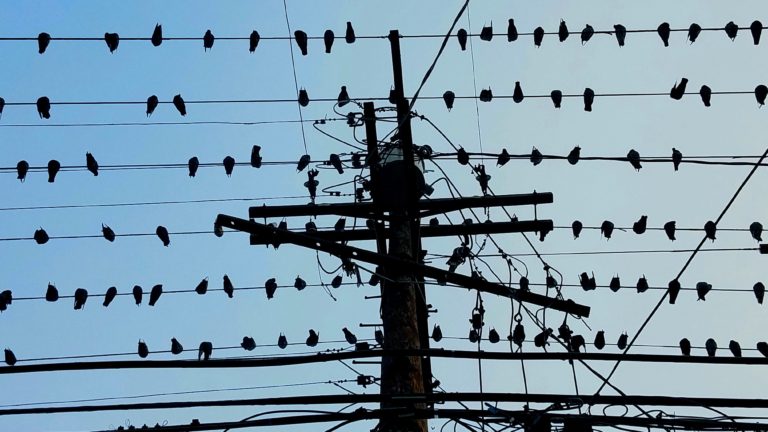Michael Manerowski – Fiction
The next morning, he woke up at his usual, pre-dawn time. He cooked an egg and smeared butter on wheat...

The Routine of an Old Man
An old man lived alone in an apartment. He’d been living alone for many years. For his wife had died of breast cancer even before he or she could claim to be old. His two adult children had long since moved to different cities and had families of their own. And so, the man lived alone.
He’d developed a routine to his days. Not very complex or impressive. But, when living alone, a routine can save a man from loneliness and despair, for the very routine itself becomes like a companion. With you every day. Dependable.
So every day, after waking before dawn and having an egg with buttered toast, the old man would walk to a nearby coffee shop. He liked his coffee black, fresh, and hot. The hotter the coffee, the richer the taste. So hot that it just barely scalds the tongue.
He would drink his coffee at a table by the window facing the street, watching the goings-on outside. Kids with pink and red and blue backpacks over their shoulders on their way to the school bus stop. Gray breasted and brown winged sparrows flitting through the leafy branches of the elm trees growing along the street.
Then he would return home, and continue on with the rest of his day, feeding the cat, watering the plants, listening the news on the radio, cleaning, fixing lunch, and practicing the violin, which he’d been slowly learning how to play over the past several years by following the instructions in a small booklet he’d found in a used bookstore.
Well, one morning, when he arrived at the coffee shop, he noticed a woman. About his age. Grayed hair. The same as he. She sat alone at the table by the window. The old man was uncertain what to do. For, she was sitting at his table. Of course, it wasn’t his table. It was open to any paying customer. And she had before her a glass of creamed tea. So, she was indeed eligible to sit at the table. He couldn’t deny that. But, a man has his routine. And that routine may be the very structure, the very companionship needed to keep him from falling into the oppressive grips of loneliness and despair. You take that routine away and all sense of meaning to one’s day may dissipate into utter nonsense.
The old man ordered his coffee at the counter, hot and black and fresh, and he decided to approach the table and introduce himself to the woman.
Right away, he noticed the pleasant, slender, oval shape to her face.
“Dear, Miss,” he said, “I see that you are sitting alone this early morning, and I ask you kindly if I may sit with you for a while as I drink my hot coffee, for every morning I come to sit at this table by the window and watch the day outside begin.”
Well, the young woman was surprised that such a nice, young man, with a smartly trimmed, silverish beard had approached her and introduced himself in such a polite way that she replied, without even thinking about it, with a smile on her lips and a smile in her eyes and smiles beaming from her bright cheeks, which blushed slightly, for she was a bit embarrassed by her interest in the man.
All she could stammer out was, “Why, why, yes … kind Sir. You may join me while you have your cup of coffee.”
And the man grinned back at her in a polite and thankful way, glad to be able to sit at his table by the window. And he almost winked. But he refrained. He didn’t want to seem too forward, you see.
But, he also paused in his thoughts as he sat down in the chair facing her, for he realized that she did not say, “You may join me while you drink your hot coffee,” but, merely, “You may join me while you have your cup of coffee.”
That distinction troubled the man. For, as he was well aware, many in the world see a cup of coffee as a mere cup of coffee, something to help get one through the morning. And the way she casually said, “cup of coffee,” she might as well have been saying “can of soda” or “bottle of water.”
The man made a quick decision to forgive her comment, which he had perceived as insensitive and crude. She couldn’t be expected to know just how much he enjoyed hot coffee, he reasoned.
Settled in his chair, the old man was about to take a first sip when the woman spoke up.
“So,” she began, “You say you come here every morning?”
Pausing, the cup raised halfway to his mouth, the warm, bitterly aromatic steam wafting at his lips, he replied, “Why, yes, I do. Every morning, Ma’am. ‘Cept Sundays, when I’m at church.”
“Church on Sundays too. May I ask your name?”
“Joseph. And yours?”
“Helen. It is very nice to meet you, Joseph.”
The old man was just about to sip from his cup when he realized it was his turn to reply, and she was looking at him, expectantly, smile still bright, blinking her sharp, dark eyes.
“Likewise,” he said. “Likewise.” Then, out of politeness, though with a tinge of reluctance, which he masked beneath a congenial tone, he followed up with “What brings you here this morning?”
“I’m here on a scouting mission for our knitting group at the seniors’ home where I live.”
“Sounds like an important mission,” the old man replied, still holding his cup midair.
“We’re looking for a nice local coffee shop to host our weekly outings.”
Again, hopeful for a pause in the exchange, the old man raised his cup even closer toward his lips. But he did so the very moment Helen asked, “Are you living in a senior’s home somewhere in the area?”
The old man, tempted by the robust, burnt, nutty scents of his coffee and the steam rising in the chill of the air, forced himself to refrain from sipping, despite the watery anticipation effusing upon his tongue, out of curtesy, given the ongoing conversation.
To be polite, and so he could better focus on the social engagement at hand, he set his coffee down on the table. He even removed his fingers from where they had grasped the cup handle, so as not to encourage his temptation to raise the cup and sip from it.
“I live a few blocks east of here. In an apartment. How’s living at the senior’s home?”
“Oh, it’s lovely. I’ve made so many friends there.”
At that point, the old man was hoping Helen might go on for a while, describing life at the home, thereby allowing him ample opportunity to swallow down multiple sips from his coffee, which, by his estimate, should still have been sufficiently hot.
But Helen did not go on about life at the seniors’ home. It seems she was more curious to learn about his life than she was interested in telling him about hers.
“Tell me, Joseph, have you been living in your apartment very long?” she asked.
And the conversation went on that way for some time, she asking him lots of questions, he, feeling both obliged, out of politeness, and compelled, partly due to the lovely glints of light flashing from her small, dark eyes, to answer her questions and to engage in conversation with the kind woman.
As they went along chatting, as the school children with their backpacks passed, as the sparrows flitted from elm branch to elm branch, as the sun rose over the building tops, the old man from time to time tried to get in a sip of his hot coffee. But so lively was their exchange that his cup remained on the table, the rim of which, much less the coffee within, went untouched by human lips.
Eventually, after more than a half hour had passed, a brief pause in the conversation arose. The man, long past eager, reached for his cup, raised it swiftly and surely to his lips, only to find that the coffee had turned bitterly cold.
He nearly spat out the sip he briefly held in his mouth, but he politely refrained from doing so, to not offend Helen, and he instead choked the cold, acrid, biting fluid down his throat.
He sighed and looked up at Helen.
“Well, Helen, it’s been nice meeting you and I’ve enjoyed talking with you, but it is time for me to head home, for my coffee has turned cold, and I have to get on with my day.”
It then occurred to Helen that perhaps Joseph was currently in a relationship. “He doesn’t wear a ring,” she thought, “but in this day and age, that’s not saying all that much. Couples live together in all sorts of arrangements, for good or for worse.”
Perhaps the man had tired of playing the flirting game, went her thoughts, when he’d remembered his girlfriend waiting for him back at home.
“Well then okay, Joseph, if you will…” Helen said. “I wish you a nice rest of your day. It was a pleasure meeting you.”
“Yes,” the old man replied. “I wish you a nice day as well.”
The old man returned his cup to the counter and started off on his walk home.
Along the way, sparrows were flying in and out of the leafy elm branches. About five to seven of them. Females. Muted gray underbellies and soft brown wings and backs. Gleeful, frisky, swift, and chirping up quite a song. Yet he could not smile at them as he usually did. Something was off. He didn’t feel quite right. In fact, he felt quite grumpy and out of sorts. And, as he walked along and saw some school children playing at recess, kicking their legs back and forth in the air as they swung high up, then swooped downward on the swings, he found he could not smile at them either. He wanted to. But he found that he could not. For he felt quite grumpy and out of sorts.
By the time he arrived home, he was in a downright awful mood. He said to himself as he snapped shut the deadbolt to his front door, “It was nice meeting Helen. That is true. But, I am quite upset about my coffee turning cold. What good is it to have a conversation over coffee if your coffee only goes to waste?”
Well, for the rest of day, the old man shuffled around his apartment in an upset mood as he followed his routine. He switched on the radio to hear the news. He turned it up loud. There was reporting on two major wars abroad and a local street shooting with at least two injured. “What a rotten place, this world,” ran his thoughts. He scolded the cat for making a mess in the litter box. He hastily, dare we say, angrily swept up the dust from the kitchen floor. Lunch was unsatisfactory, give a certain bruised, softened, and tasteless tomato. And he nearly snapped a string on his violin even while just warming up the bow to practice.
***
The next morning, he woke up at his usual, pre-dawn time. He cooked an egg and smeared butter on wheat toast. After washing the dishes and scrubbing clean the pan, he left his apartment, and started off down the street, on his way for his morning coffee, having forgotten all about the ill feelings of the previous day, joyful to see the sparrows flying in and out of the elm leaves, smiling at them as they did, and joyful to see the children with their backpacks weighted down on their shoulders headed for the school bus stop.
He soon arrived at the coffee shop, eager for his hot and black and fresh cup of coffee.
When he entered, he looked over at the table by the window. Wouldn’t you know, Helen was sitting there with a book open and glass of creamed tea.
Well, the old man decided to order his coffee, but he did not ask to join Helen at the table by the window. Instead, he took a table near the back of the coffee shop, where he was sure to have time and quiet to enjoy his coffee. It was dark, a bit dingy, and near the bathroom with a crooked wooden door hanging from a broken hinge – when someone went inside and switched on the light, you could hear the fan inside whirring and blowing.
All the same, he was glad to sip his hot coffee in silence. And he still had a view out the window. Though, it was hard to see any sparrows flitting about in the elm branches, for his table was at the opposite end of the coffee shop. Occasionally, he saw one or two, a soft brown spearing across his narrow, rectangular view. And he was able to recognize a child with a backpack. But the child passed by quickly, and so far away was the child that the old man wasn’t able to catch a glimpse of the youthful face as the child walked along.
And, he noticed Helen sitting at the table as she sipped her glass of tea. She sat facing the window, reading her book. Apparently, she had not noticed Joseph, and we can only assume that she had returned to the coffee shop in hopes of meeting him again.
But soon Helen turned away from the window, set down her book, and, in less than a moment, spotted Joseph sitting in the back, in the dark, alone beside the bathroom door.
She waved at him and hollered for him to come over, “Oh, hello, Joseph. Hello. Won’t you come over and sit with me this morning again where we can talk the morning away?”
Well, by that time, Joseph had finished his coffee. He looked into his empty cup and he shrugged.
He stood up from his table, empty cup in hand, and he approached Helen, saying, “Well, I wish you a nice day, Helen. I wish you a nice day. I have finished my hot coffee and I have many things to attend to at home. Again, I wish you a nice day.”
And, with that, he returned his cup to the counter, left the coffee shop, and started off for home.
Let us remember, dear readers, a man has his routine. And a man has a right to trust in his routine. For a routine is dependable. Always there for you. A routine is like a companion.
Well, the old man didn’t get much farther than two blocks when he realized that he felt rather unsettled, just as he did the day before. Now, it wasn’t because he hadn’t had his hot coffee that morning. For, indeed, he had. He’d sipped it all down to the last drop. All while it was still hot.
It then occurred to him that perhaps it had something to do with Helen. He’d more or less brushed her off just moments earlier. Perhaps he ought to have at least been a decent gentleman and sat down with her, if even for a little while, to talk about whatever was on her mind. Had the knitting group decided where to have their weekly outings?
So, without blinking over it, without thinking twice, he turned right around and started back toward the coffee shop. Some sparrows flew in and out of the elm leaves, little brown, rounded spears ducking into the shadows or bursting out into the morning light. Indeed, that time, he smiled back at them. Not only once. But twice. Since he was happy and excited and proud of himself for having turned right around, and was walking back to the coffee shop, intending to meet with Helen and talk with her some more.
Well, wouldn’t you know. Alas. Poor old man Joseph. The table by the window was empty. And Helen was nowhere to be found.
Every day since then, the old man has returned to the coffee shop, to the table by the window with his hot and black and fresh coffee, happy to drink it down as he watched the people pass and the sparrows fly in and out of the elm leaves. But he was not too happy to have never found Helen sitting at his table ever again.
You can learn more about Michael by clicking on his bio: https://thievingmagpie.org/michael-manerowski-bio/



